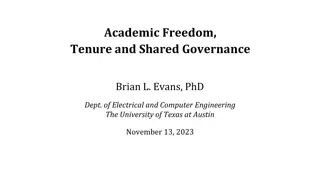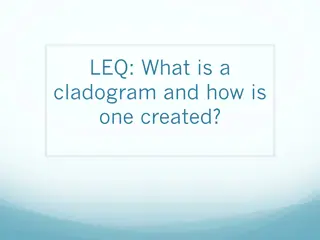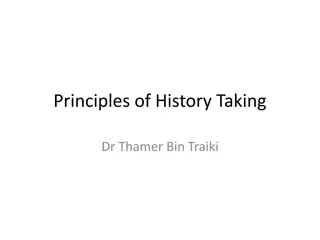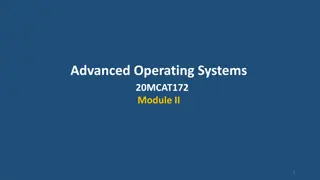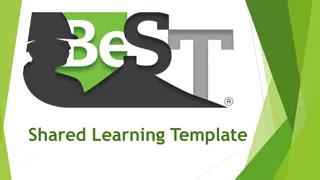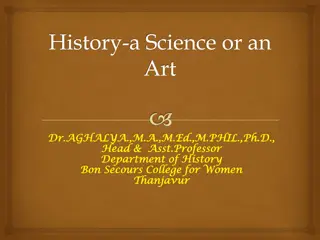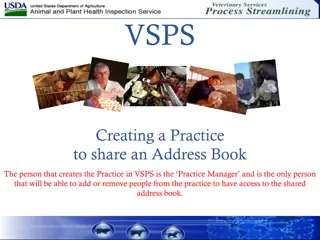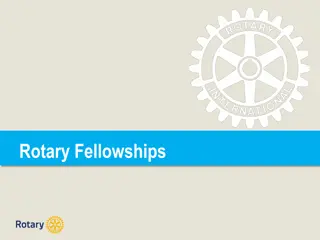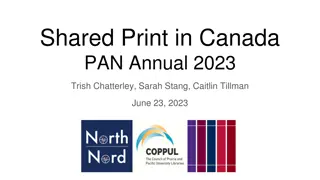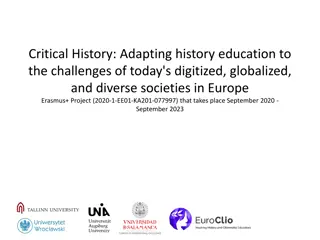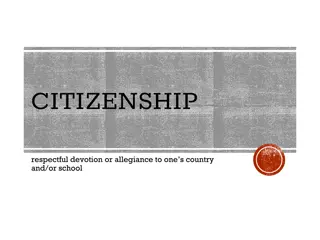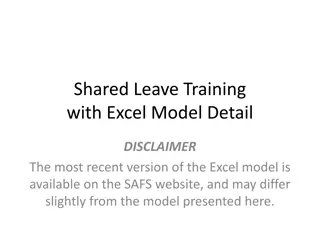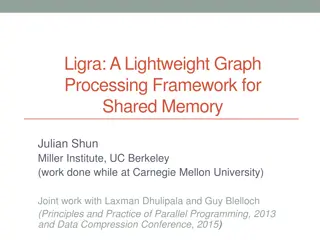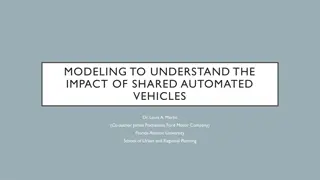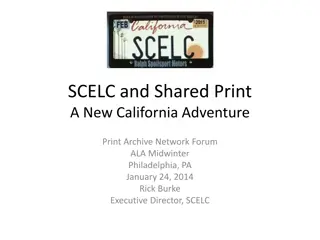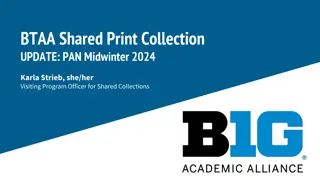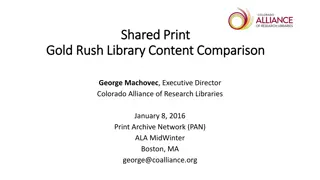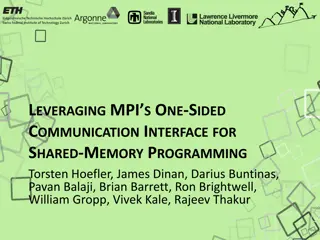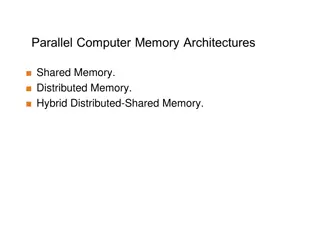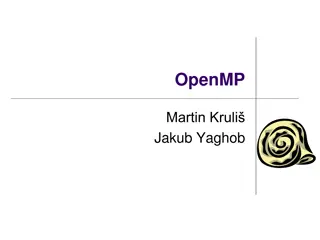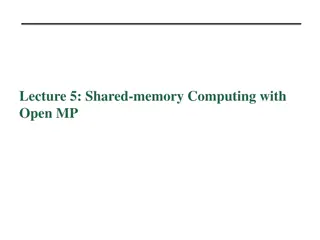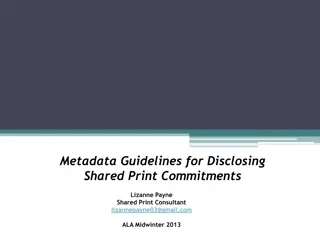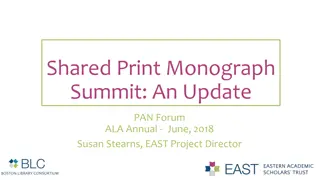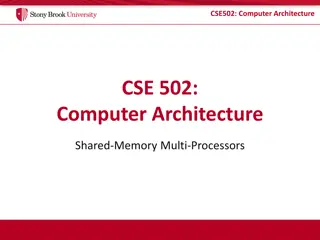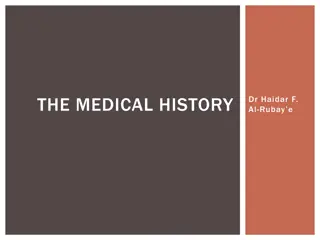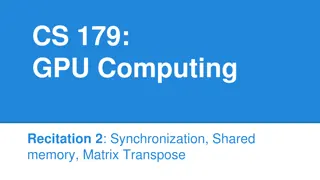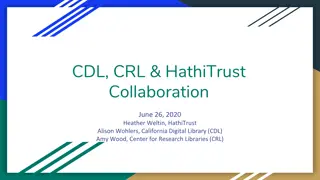Importance of Academic Freedom, Tenure, and Shared Governance in Higher Education
Academic freedom, tenure, and shared governance are crucial in higher education for fostering open inquiry, protecting faculty rights, and ensuring institutional integrity. Organizations like the American Association of University Professors (AAUP) advocate for these principles to uphold faculty aut
5 views • 9 slides
Understanding Cladograms and Phylogenetic Analysis
Cladograms are used in cladistics to illustrate evolutionary relationships between organisms based on shared ancestral and derived characters. They are created by grouping species by common descent, forming clades that include an ancestral species and all its descendants. Valid clades are monophylet
0 views • 11 slides
Principles of History Taking in Clinical Assessment
History taking is a crucial process in patient assessment, aiding in determining the etiology of medical issues. Obtaining an accurate history through proper questioning, active listening, and maintaining a professional appearance is vital for making accurate diagnoses. The history should follow a s
1 views • 35 slides
Understanding Distributed Mutual Exclusion in Operating Systems
In distributed systems, the problem of mutual exclusion arises when multiple sites/processes need to access shared resources concurrently. Unlike in single-computer systems, distributed systems lack shared memory, leading to the need for communication-based approaches rather than shared variables li
0 views • 49 slides
Understanding Shared Memory Architectures and Cache Coherence
Shared memory architectures involve multiple CPUs sharing one memory with a global address space, with challenges like the cache coherence problem. This summary delves into UMA and NUMA architectures, addressing issues like memory latency and bandwidth, as well as the bus-based UMA and NUMA shared m
0 views • 27 slides
Enhancing Organizational Learning through BeSafe Taranaki Shared Learnings
BeSafe Taranaki Shared Learnings aims to facilitate cross-organizational learning by sharing insights from incidents and investigations. The focus is on identifying key lessons, target audiences, necessary process changes, and safety expectations. Two types of learnings are emphasized: Immediate Not
2 views • 9 slides
Essential Skills for Musculoskeletal History Taking
History taking is crucial in diagnosing musculoskeletal conditions, with a clinician being 60% closer to a diagnosis with a thorough history. This session covers the structure of history, MSK systemic review, pain assessment, swelling evaluation, and more. Students will learn to take a relevant hist
0 views • 24 slides
Is History a Science or an Art? Debating the Nature of Historical Study
Opinions are divided on whether history should be classified as a science or an art. While history employs techniques similar to scientific methods for research, certain aspects distinguish it from traditional sciences. Arguments against history as a science include the inability to forecast, the co
0 views • 12 slides
Understanding Uterine Cancer and Postmenopausal Bleeding
Dr. Khalid Akkour, Assistant Professor of Gynecologic Oncology at King Saud University Medical City, provides insights on uterine cancer and postmenopausal bleeding. The structured OSCE discusses important aspects such as taking a focused history, age, ethnicity, past gynecologic and obstetric histo
0 views • 154 slides
Creating a Shared Address Book in VSPS
Learn how to create a shared address book in VSPS by setting up a practice managed by the Practice Manager, who can add or remove users to access the address book. Follow step-by-step instructions to invite users and manage access to the shared address book efficiently.
0 views • 24 slides
Various Branches of History Explored
Explore different branches of history such as Political History, Constitutional History, Parliamentary History, Legal History, Military History, Diplomatic History, and Social History. Each branch delves into specific aspects of the past, shedding light on politics, governance, warfare, diplomacy, a
1 views • 18 slides
Exploring Rotary Fellowships: Connecting Through Shared Interests
Rotary Fellowships bring together Rotarians, their families, program participants, and alumni to connect and explore shared interests in recreational activities, hobbies, sports, vocations, Rotary history, culture, and more. With more than 70 officially registered fellowships, examples include cycli
0 views • 16 slides
Understanding Shared Memory Architectures and Cache Coherence
Shared memory architectures involve multiple CPUs accessing a common memory, leading to challenges like the cache coherence problem. This article delves into different types of shared memory architectures, such as UMA and NUMA, and explores the cache coherence issue and protocols. It also highlights
2 views • 27 slides
Shared Living Service Overview for Independent Living with Supports
The Shared Living Service, facilitated by Deanna L. Parker, MPA VA DBHDS, offers individuals aged 18 and above the opportunity to live independently with some support. This service is available under all three waivers and entails a one-to-one living arrangement where a roommate provides agreed-upon
0 views • 20 slides
Collaborative Shared Print Initiatives in Canadian Libraries: PAN Annual 2023
North/Nord initiative began in August 2021 to coordinate shared print efforts across Canadian libraries, focusing on Canadian materials. The program evaluation is set for Summer 2023, emphasizing collaboration for success. COPPUL SPAN expands on prioritizing partnerships, Indigenous publications, an
3 views • 5 slides
Enhancing History Education for Today's Societal Needs: Erasmus+ Project 2020-2023
This Erasmus+ project aims to adapt history education to modern challenges by preparing history educators to teach in a way that meets societal demands and incorporates the latest in history didactics. Partners focus on heritage, global dimensions, public history, and the role of the internet. Resul
1 views • 4 slides
Understanding Citizenship: A Shared Identity and History
Explore the diverse perspectives on citizenship through respectful devotion to one's country or school. Discover what citizenship means to individuals in just six words and how it ties into shared histories and identities. Delve into the American Dream and the shared privilege it represents, emphasi
0 views • 18 slides
Explore Partnership in Action: Developing Shared Visions
Delve into the world of partnership development with a focus on shared visions and collaborative practices. Uncover the aims of the session, project information, and creative processes involved. Learn about key aspects such as partners in the collaboration, unique projects and innovations, and the i
0 views • 12 slides
Excel Model for Shared Leave Training Detail
The Excel model for shared leave training detail allows school district employees to share leave both within and outside their district. The model facilitates the calculation of hourly salary rates and benefits for employees interested in participating in the shared leave program. The implementation
0 views • 12 slides
Effective Strategies for Shared Reading in Non-Fiction Settings
Shared reading in non-fiction is an effective approach to reinforce literacy skills while teaching subject-specific content. Teachers choose texts that match students' reading levels, are cross-curricular, and engaging. Discussions, predictions, vocabulary exploration, and historical context are int
0 views • 22 slides
Understanding Medical Records: History, Physical Examination, and Abbreviations
Medical records play a crucial role in documenting a patient's medical history and findings from physical examinations. The history and physical (H&P) document includes subjective information from the patient and objective observations by the examiner. The history (Hx) record covers personal medical
0 views • 20 slides
Ligra: A Lightweight Graph Processing Framework for Shared Memory
Ligra is a lightweight graph processing framework developed by Julian Shun during his time at the Miller Institute, UC Berkeley. This framework, created in collaboration with Laxman Dhulipala and Guy Blelloch, is designed for shared memory systems to efficiently analyze large graphs. Key features in
0 views • 21 slides
The Intricate Relationship Between Language and Culture
Language serves as a vital tool for social interaction, intricately woven into the fabric of culture. It expresses, embodies, and symbolizes cultural realities. In the interplay of nature and culture, language immortalizes and transforms elements like roses, embodying essential aspects of society. T
0 views • 9 slides
Introduction to Boston University's Shared Computing Cluster
Boston University's Shared Computing Cluster (SCC) provides researchers with access to a high-performance computing environment for running code, collaborating on shared data, and utilizing specialized software packages. With over 800 nodes, 20,000 processors, and hundreds of GPUs, the SCC offers re
0 views • 63 slides
Impact of Shared Automated Vehicles on Transportation System Performance
This study by Dr. Louis A. Merlin and James Fischelson explores the potential impact of shared automated vehicles on transportation systems. By reviewing 39 papers and simulations, the research delves into the implications of new shared automated modes, such as automated taxis, shuttles, and shared
0 views • 38 slides
SCELC Shared Print Feasibility Study Overview
Explore the goals and challenges of the SCELC Shared Print Feasibility Study, focusing on understanding member readiness, collection analysis, sustainability proposals, user behaviors, and cost analysis. The study aims to develop shared print programs to preserve and share print materials among dive
0 views • 12 slides
Transforming Big Ten Libraries through Shared Print Collections and Collective Action
Aspiration for a tremendous vision to unite Big Ten university collections into one shared and fully networked "BIG Collection." This initiative aims to increase findability, usability, and value at scale while deepening interdependence and resilience for an uncertain future. The Knowledge Commons w
1 views • 10 slides
Debate on Shared Sanitation: Improved or Not?
The discussion revolves around the classification of shared sanitation as improved or unimproved. WHO and UNICEF have a classification system where shared sanitation is considered unimproved due to concerns about cleanliness and accessibility. A proposed policy change by JMP seeks to include shared
0 views • 22 slides
Alliance Shared Print Program Overview
Colorado Alliance of Research Libraries established the Alliance Shared Print program focusing on distributed print repositories. The program allows libraries to voluntarily participate, maintain their holdings, and retain materials on behalf of the group. Key features include flexibility, no centra
0 views • 21 slides
Leveraging MPI's One-Sided Communication Interface for Shared Memory Programming
This content discusses the utilization of MPI's one-sided communication interface for shared memory programming, addressing the benefits of using multi- and manycore systems, challenges in programming shared memory efficiently, the differences between MPI and OS tools, MPI-3.0 one-sided memory model
0 views • 20 slides
Understanding Shared Memory, Distributed Memory, and Hybrid Distributed-Shared Memory
Shared memory systems allow multiple processors to access the same memory resources, with changes made by one processor visible to all others. This concept is categorized into Uniform Memory Access (UMA) and Non-Uniform Memory Access (NUMA) architectures. UMA provides equal access times to memory, w
0 views • 22 slides
Introduction to OpenMP: A Parallel Programming API
OpenMP, an API for multi-threaded, shared memory parallelism, is supported by compilers like C/C++ and Fortran. It consists of compiler directives, runtime library resources, and environment variables. The history spans various specification versions, with features like tasks, SIMD, and memory model
0 views • 33 slides
Shared-Memory Computing with Open MP
Shared-memory computing with Open MP offers a parallel programming model that is portable and scalable across shared-memory architectures. It allows for incremental parallelization, compiler-based thread program generation, and synchronization. Open MP pragmas help in parallelizing individual comput
0 views • 25 slides
Metadata Guidelines for Disclosing Shared Print Commitments
Shared Print Metadata Guidelines aim to establish new Shared Print Institution Symbols and add them to bibliographic records for resource sharing. These guidelines involve creating MARC Local Holdings Records (LHRs) to document archiving commitments for journals. The Shared Print initiative supports
1 views • 12 slides
Shared Print Monograph Summit: Progress and Future Directions
The Shared Print Monograph Summit held in June 2018 focused on collaboration and coordination among North American shared print programs. Key priorities included open data on retention commitments, research on risks, establishing community standards, and more. Working groups were formed to address o
0 views • 24 slides
Understanding Computer Architecture: Shared Memory Systems
Shared memory multiprocessors in computer architecture involve multiple threads using shared memory for communication, with synchronization complexities and implicit communication challenges. Despite these drawbacks, Shared Memory Systems have proven to be successful machines due to their evolutiona
0 views • 40 slides
Efficient Medical History Taking Guidelines
Medical history taking is a crucial step in diagnosis, involving the patient's account of illness and relevant information. Following a structured framework helps identify potential diagnoses. Key elements include personal information, chief complaint, presenting illness history, review of systems,
0 views • 51 slides
Synchronization and Shared Memory in GPU Computing
Synchronization and shared memory play vital roles in optimizing parallelism in GPU computing. __syncthreads() enables thread synchronization within blocks, while atomic instructions ensure serialized access to shared resources. Examples like Parallel BFS and summing numbers highlight the need for s
0 views • 21 slides
Ophthalmology History Taking: Importance and Components
Ophthalmology history taking is crucial for identifying and narrowing down differential diagnoses, screening for hidden diseases, and protecting patients from harm. Components include patient profile, chief complaint, history of present illness, past ophthalmic and medical history, drug and family h
0 views • 24 slides
Collaboration for Shared Print Collections: Vision, Mission, and Principles
This collaboration between HathiTrust, CDL, and CRL aims to enhance access to shared print collections, promote equity in scholarly resources, and leverage networks for collaborative infrastructure. The vision includes embedding shared print in library collections, enriching the scholarly record, an
0 views • 10 slides
